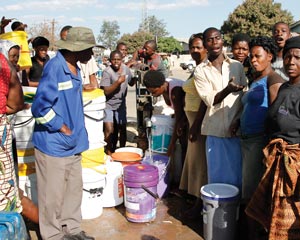
Leaders are responsible for those whom they lead. The lives of the people are entrusted to them.
Fr Oskar Wermter SJ
The leaders must create conditions which allow people to make a living and stay alive. Of old, chiefs provided food for the people in times of need from a granary (zunde raMambo) for that purpose.
In our day land, manpower, skills and expertise, as well as investment capital must be organised in such a way that the people use the land productively.
Indigenisation and greater equity in the distribution of land and the means of production may be an excellent long-term goal. But if it does not provide work for the workless and give them food, at least in the short term, then the welfare of the people may demand a different strategy.
The people and their welfare, their sheer survival, come first. They must not be sacrificed to an ideology, splendid in itself, but of little practical value in saving the people from economic ruin and starvation.
Leaders with political responsibility must study these problems intensively and be engaged with industrialists, agricultural economists, trade unions and employers at all times.
Alas, politicians care little about the real problems of the country. With a few laudable exceptions, most of the time they are busy fighting each other for top posts. The struggle for power and the acquisition of wealth occupy them much more than the worries of the people whom they represent.
- Chamisa under fire over US$120K donation
- Mavhunga puts DeMbare into Chibuku quarterfinals
- Pension funds bet on Cabora Bassa oilfields
- Councils defy govt fire tender directive
Keep Reading
A true leader must care about the little people, the ordinary citizens in town and country. True leaders must be unselfish. They must make the worries of ordinary workers, and even more so of all who have no work, their very own.
A leader is not one who “has made it”, at long last free from all financial worries, with a luxury car that takes him away from the people, not to them. Quite the opposite, true leaders must go out to the people and share the heavy burden of their lives and carry it with them.
In our Zimbabwean situation, unemployment, especially of the youth, must give them a real headache. Old widows and young single mothers sitting as vendors at street corners are for them not a problem of policing and security, of law and order, but a human problem.
They must feel in their hearts what life is like for self-employed women in the informal sector who have to send their children to school from the tiny income they get from selling vegetables or handicraft or even themselves at night.
This hopeless situation drives many across the Limpopo to South Africa. Having escaped the crocodiles, they may fall into the hands of the maguma-guma, robbers and rapists. Some social workers of the church, eg nuns, try to help the shocked economic refugees. But that can only be First Aid.
A priest friend from Tzaneen tells me that he has never seen Zimbabwean leaders seeing for themselves what happens to their own people stuck between their own country that has abandoned them, and their host country that does not want them.
Surely our leaders know that it is two main causes the world over that drive people into exile: war and violence, and poverty and unemployment. Charity, though welcome in the midst of acute hunger and misery, cannot solve the problem.
Our economy must be revived and factory gates must be reopened, workers must take up the tools once more and re-start production. Ideological obstacles must be removed.
The shouting of slogans in support of one’s own party at the forthcoming election must stop. The survival, not just of one’s own friends and clients, is at stake, but of the people as a whole, regardless of their political sympathies.
For such magnanimity and humanity we need statesmen, not just party agents, mothers of the nation, not just female party propagandists.
It seems our government does not bother about migrants; “good riddance” seems to be the feeling in the corridors of power, though combined with hoping that eventually the migrants will send remittances back to Zimbabwe.
South Africa does not see distressed neighbours in them, not even potentially useful workers, but only troublesome vagrants.
Should not the two countries come together and negotiate a solution? Would it not be in the long-term interest of both countries to relieve the suffering of their people, African brothers and sisters? Is this not the humanism a people proud of their heritage of unhu/ubuntu should have?
Is this not the job of Sadc to bring the two together and assist them in rebuilding the Zimbabwean economy, the root cause of this migration?
It must be in the interest also of South Africa to restore economic sanity north of the Limpopo (ignoring the current economic advantage for South African business which sells Zimbabwe what it cannot produce itself at the moment).
The people must come first, and the economy must serve them.











